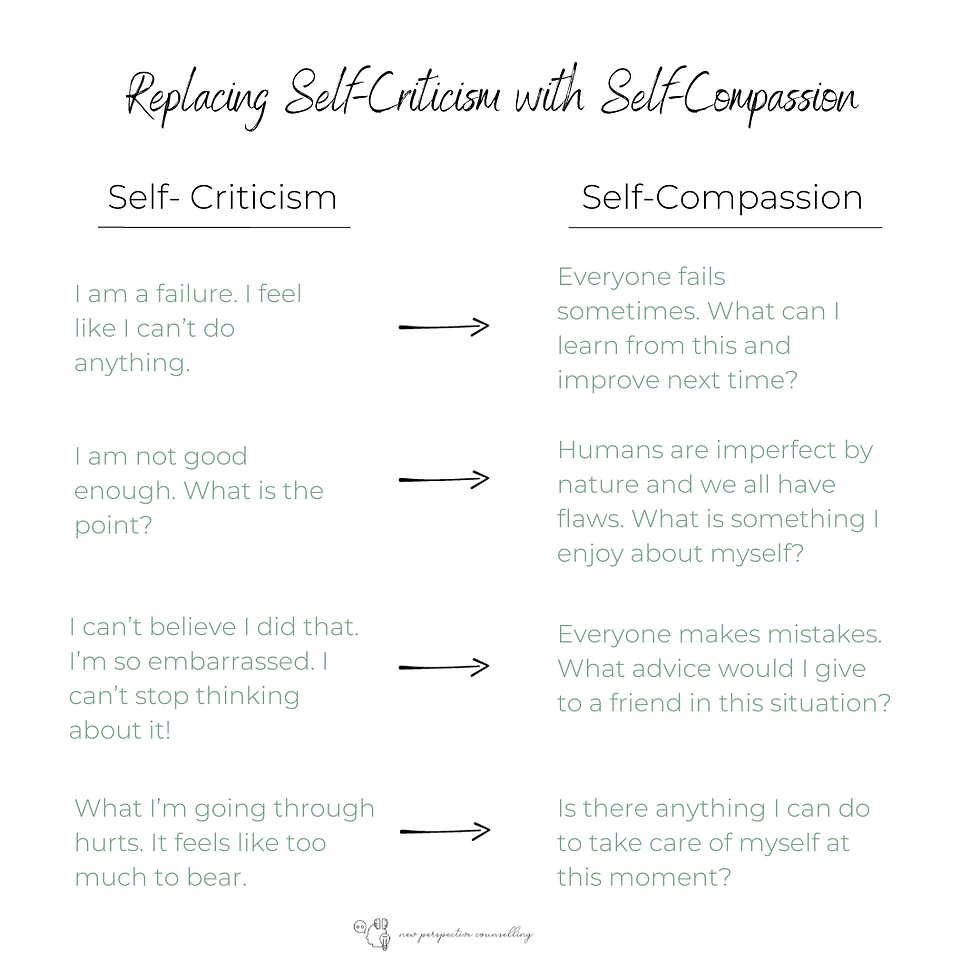Recognizing self-criticism may be overwhelming and that’s ok. If we truly kept track of how many times a day we engage in self-criticism, the world would run out of paper. I know that seems dramatic but think about it. If I were to ask you, tell me three things about yourself you love and three things about yourself you dislike? And then asked, which question was easier to answer? I bet the dislike question would win.
It is easy to view ourselves from a self-criticism lens. Do any of these sounds familiar?
“I’m a failure”
“I can never do anything right”
“I am not good enough”
“I should have done better on that test”
“I am not going to get the promotion at work”
“They will choose someone else”
Those are examples of self-criticism.
Self-criticism includes phrases of negative self-talk, resulting in feelings of worthlessness, failure, and guilt.
It is no surprise that being self-critical has a huge negative impact on our overall wellbeing and happiness. Self-criticism affects us externally as well, we may not pursue academic, social, and health-related goals. Additionally, an individual may experience a heightened sense of:
Low self-esteem
Self-harm
Perfectionism
Social anxiety
Body image issues
Signs you may be too self-critical:
You have a hard time accepting compliments.
You constantly over analyze mistakes.
You often compare yourself to others.
You are rarely satisfied with your achievements.
You rarely assert your needs and desires.
You may blame yourself for every negative situation.
Start challenging self-criticism by asking: what if I criticized a loved one or friend the way I criticize myself?
Self-compassion on the other hand, is treating yourself like someone you care about, with support, encouragement, and worth.
- Kristen Neff
When we are able to live our lives utilizing a self-compassion lens, we take note of our positive qualities making it easier to celebrate ourselves. (This is why we celebrate every win, big and small in my office!) When we talk about self-compassion, we do not mean ignore all negativity. We mean, seeing yourself as you truly are; the strengths and weaknesses and addressing them from a place of self-compassion, by meeting your own needs and seeing yourself as worthy.
How you can start working towards Self-Compassion
Notice self-talk: in times of failure or challenges, noticing your self-talk can help you replace it with self-compassion. Examples:

Write yourself a letter: when your emotions are overwhelming, write a letter to yourself as if you were writing to a friend. It might feel strange at first, but your comforting words will help to normalize the situation rather than fall into a self-criticism thinking trap.
Writing exercise experiment: to practice using self-compassion as an alternative to self-criticism, try the following three-minute writing exercise.
There are two versions of this exercise – one that involves thinking about a past mistake and another that involves thinking about something you perceive as a major weakness. Identify a mistake or weakness that you want to focus on, and then for three minutes using the following instructions “imagine that you are talking to yourself about this weakness or mistake from a compassionate and understanding perspective. What would you say?”
Try this experiment now or store it away for a future situation in which you find yourself ruminating about a mistake or weakness.
Let's leave it at that for now.
PS. Having self-compassion is hard - be patient with yourself. You got this!
Until next time,
Chantel

Sources: https://www.choosingtherapy.com/negative-self-talk/

Comments